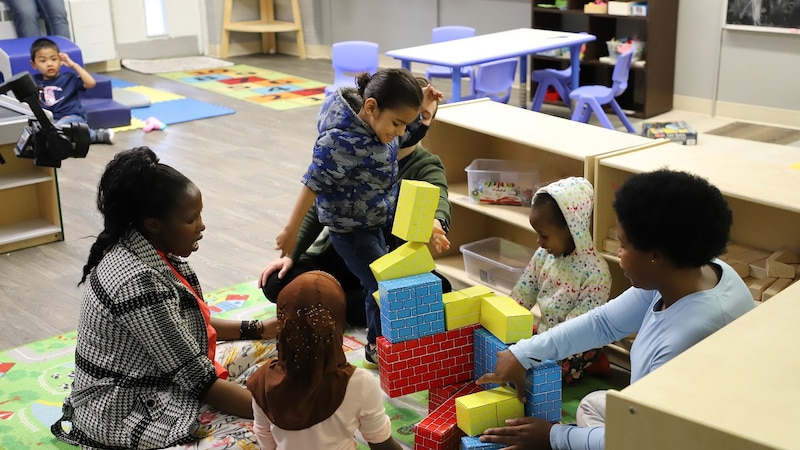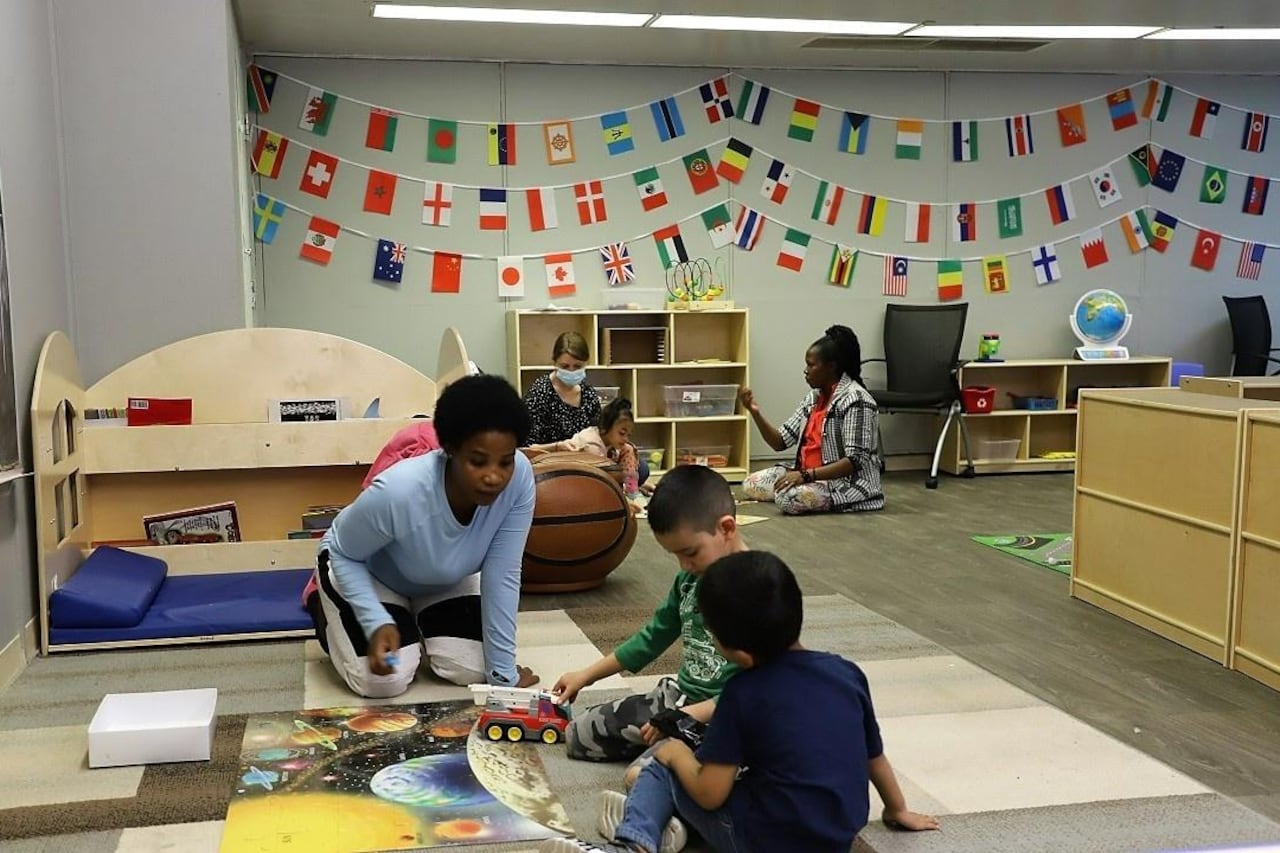This story originally appeared on Rocky Mountain Public Media and is republished here with permission.
A classroom full of toys, puzzles, costumes, books, flags from around the world and energized children is a place Clementine Gasimba gravitates toward.
“I enjoy being with children, and it’s my passion to be with children,” said Gasimba with a big smile on her face.
What makes this particular preschool classroom unique is the children — among them, they speak up to 10 different languages. Knowing half a dozen languages herself, Gasimba can speak and relate to many of the children, but still has a few she teaches who she doesn’t share a common language with.
Gasimba is one of several teachers at The Little Village, an early childhood center part of an organization called The Village Institute. The Village Institute aims to serve refugee families from a holistic approach, providing housing, language resources, childcare, job readiness, and mental health services, all under one roof.
That includes a pipeline where refugee women, including Gasimba and Harriet Kwitegetse, can go through education and certification courses to help advance their careers. In this case, the training put Gasimba and Kwitegetse directly back into serving other refugee families by leading a preschool class.
“Clementine and Harriet are two teachers here in our preschool classroom and both are just amazing individuals. They’ve done so much to support not only their own families but others in the community,” said Rebecca Gartner, the director of child and youth programs and founder of The Little Village.
Gartner explained that both Gasimba and Kwitegetse have completed their early childhood education classes and earned their child development associate credential. They are also continuing their higher education by taking more early childhood education classes. This is all done through the Pamoja Village program, which partners with Empowering Communities Globally and Lutheran Family Services Rocky Mountains to provide these classes in six different languages to “reduce that language barrier... so that people can continue their education in their first language,” said Gartner.
The importance of language is not lost on Gasimba and Kwitegetse. Both women are originally from Democratic Republic of Congo. They both left the country to seek a safer life, which eventually led them to the United States. Kwitegetse fled Democratic Republic of Congo as a child and traveled to Uganda, where she lived for several years before coming to Colorado in 2017. That is when she began building a life here.
“We refugees — who’ve come from other countries — we have barriers here in [the] U.S. because when we reach here and we have children, there’s no way we can work,” said Kwitegetse, speaking from her own experience and others she knows. And that’s why working at this early childhood center is of such importance to her, knowing this center provides free childcare, which can give other refugee mothers the chance to have children and find a job.
Gasimba said she ran away from Congo a long time ago and lived in a refugee camp in Rwanda for 18 years until she had the chance to the come to the United States. Although she has lived in the U.S. for several years, Gasimba recently found The Village Institute as a way to help live out her passion.
“[The Little Village] is so important. It [gave] me a job; I bring my children here and they’re learning,” said Gasimba about her two children, a 7-year-old daughter and nearly 1-year-old son.
On a typical day, you could find Gasimba and Kwitegetse putting a puzzle together, helping to build a big block house, or any number of activities in a room full of mostly-donated toys. With more than a dozen children between 3 and 5 years old who speak a wide variety of languages, from an outside perspective it could appear to be quite the challenging job. But both Gasimba and Kwitegetse do it with smiles on their faces.
“It’s very important to me because it’s making me gain some more experiences, because in this center we have children that come from different countries, so I do study from them,” said Kwitegetse.

Both teachers also emphasized that they are not the only ones doing the teaching. Often, the kids teach them valuable lessons.
“Children taught me to enjoy myself. Like, not to be depressed, not to be, like, overthinking,” said Gasimba. “When you are with children you lose yourself, you feel happy, you feel like them because children are angels.”
Gasimba and Kwitegetse work hard every day to help give children the resources they need to thrive in a new country, especially given how many different languages the students speak. Part of the work to reach that goal, Gasimba said, is to become a team with the parents of the child. They foster a line of communication with the parents to understand what needs their child has for the day and then act in the best way they can.
Gartner pointed out a specific time Gasimba comforted a new student who was really missing their mom one day. Gartner said when she checked in on the class, she saw the child was looking content and calm as he was in a wrap tied around Gasimba.
“[He] just needed that extra support ... like, that long hug almost. And that was really nice because that’s something I would have never thought of to support that child and their first couple of days in school here,” said Gartner.
Learning from everyone involved in The Village Institute has been a core value since the organization opened in April 2020. The early learning center opened a year after that. The organization is located in the heart of Aurora near Colfax Avenue and Elmira Street, near several other refugee agencies including Project Worthmore, Denver Refugee and Immigrant Vitalization and Empowerment (DRIVE), and the Asian Pacific Development Center.
The location makes connecting with the refugee families The Village Institute hopes to help much easier, often by getting referrals through word of mouth and through partnerships with resettlement agencies. However, The Little Village is available to anyone. Gasimba, Kwitegetse and Gartner all say if people are curious, they should come check it out.
“You look around, and you see mothers supporting other mothers. And I learn something new every day from the way that these teachers provide care,” said Gartner. “We just have this kind of wealth of knowledge from around the world, which has been really inspiring and just like a great reminder for me to keep learning and to keep [those] cross-cultural connections with others.”
Gasimba and Kwitegetse provide those critical needs for the community with their work everyday, yet are very humble about their work and give a lot of credit to The Little Village and the intention behind the organization.
“I enjoy it. I love everything we’re doing here. I love it,” said Gasimba. “It’s making our community raise good citizens of tomorrow.”






